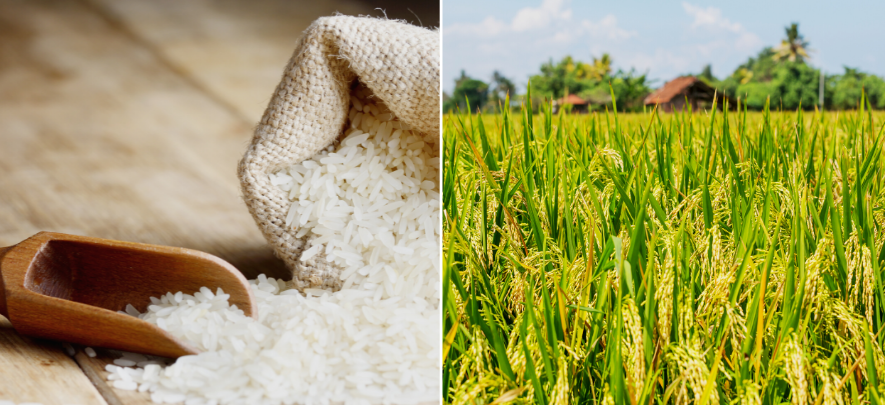Succeeding with a rice business in India

Agriculture
156 week ago — 7 min read
Rice is a staple source of food throughout Asia and hence is always in high demand. As a result, many entrepreneurs have realised the immense business potential of rice. However, like with all other businesses, there are certain things that people need to consider before they start a rice business. Since rice is a widely consumed commodity, the government has put in place several quality checks to ensure that only hygienic and high-quality rice makes its way into the market. In this article, we’ll go over everything you need to know before starting a rice business in India.
Rice business opportunities in India
Almost 70% of the world’s population consumes rice as their staple food. Every year, approximately 40,000 varieties of rice are harvested all over the world, indicating the commodity’s diverse demand. In India itself, rice is a staple that boasts of daily consumption in the south, north-eastern and eastern parts of the country. This is why starting a rice business in India is an excellent choice.
Did you know? We are the second-largest producers and consumers of rice globally. Also, India produced 7.5 million tonnes of basmati in the year 2019-20, of which 61% was exported!
India’s fertile soil, suitable weather conditions, and large quantities of arable land make it perfect for growing rice. As a result, the rice industry serves as the backbone of our agricultural sector. We are also the world’s largest exporters of rice by volume and most preferred as well. This reputation of our country is responsible for making the rice business an excellent option for budding entrepreneurs. Let us now take a look at what types of rice businesses you can start in India.
Various types of rice businesses to consider
There are several avenues you can consider when you opt to start a rice business in India. Some of the most common rice-related companies in India are engaged in the following:
- Rice farming
- Rice dealership
- Wholesale selling
- Rice mill business
- Retail rice selling
- Rice Export
To set up a rice farm, you will need a large parcel of land, a good source of water and access to labour. Additionally, you will have to be well-versed in the agricultural requirements for rice, and keep a close watch on the crop throughout the year. This is a more capital-intensive option and one that requires a lot of research. You will also have to buy the best seeds, invest in fertilisers and look into purchasing advanced farming equipment if you wish to produce large quantities of rice.
On the other hand, rice dealerships, wholesale, resale, retail and milling does not require such laborious research or extensive capital. Rice milling will require a considerable amount of initial capital infusion to set up an establishment and buy the equipment. After the set-up, however, you will be able to use the mill for decades without additional costs except for routine maintenance, unlike farming, where additional costs arise annually.
Dealerships and resale markets serve as intermediaries by connecting farmers to consumers, they do not require heavy capital infusion and are also very lucrative in terms of returns. All that said, choose the type of rice business depending on your interests and resources.
How to start a rice business in India
- To start a rice business in India, you will first need to apply for and obtain a business license. Most guidelines that apply to rice dealerships remain the same when it comes to rice wholesale and retail businesses. You can consult with Vakilsearch to gain a better idea regarding the legal requirements for your locality. The best way to ensure that your assets stay protected is to legalise the business and get it incorporated. You may choose to register your business as an OPC, an LLP, a partnership firm or a private limited company.
- You will then have to locate a large warehouse or storage room that is with good maintanance and hygienic. It is best to pick out a storage space that isn’t too far away from a town or city to make it easier to transport the rice to the final destination.
- Once you have the space set up, you will need to connect with farmers, wholesalers, retailers or customers to either obtain or offload your supply.
- You will also have to establish a delivery system using which you can get your products and deliver the required goods to your consumers. Delivery is an integral part of all dealerships.
- As your business grows, you might have to employ more people. You will have to buy more vehicles and hire more people. Make sure you comply with all the required labour laws.
- Entrepreneurs must also ensure that they implement a FIFO policy (FIFO stands for “First-In, First-Out”) to prevent any of the rice from going bad.
- Also, it is best if you offer several varieties of rice, so that you have a more diverse clientele. In this case, you will have to build a more extensive network of suppliers.
- Lastly, owners should consider getting a comprehensive insurance policy for their rice business to protect their assets.
What do you need to start a rice distribution or sales company?
- A large farm or external supplier that will serve as your primary source.
- Large warehouse to store your rice.
- Enough capital to buy large quantities of rice so that you get it at affordable rates.
- Transportation and delivery facilities, such as vans and loading and unloading staff.
- Feasibility study to understand the market and create a business plan.
- Marketing strategy to promote your products, including free samples, discounts and free delivery services.
- Good accounting system once the business starts operating to ensure you keep track of your income and expenses.
Also read: How technology can make sustainability attainable for farmers
To explore business opportunities, link with us by clicking on the 'Connect' button on our profile.
Image source: Canva
Disclaimer: The views and opinions expressed in this article are those of the author and do not necessarily reflect the views, official policy or position of GlobalLinker.
Posted by
Vakilsearch StaffGreetings! We would love to work with you and your company. We look forward to connecting with business houses and MSME's.
Network with SMEs mentioned in this article
View Vakilsearch 's profile
Most read this week














Comments (1)
Share this content
Please login or Register to join the discussion